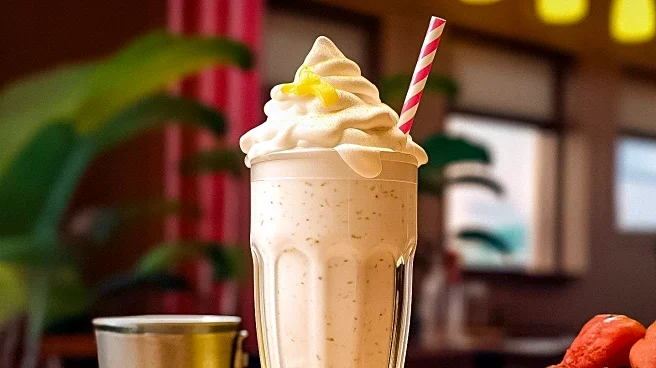What's Happening?
McDonald's has introduced a new 'McDonaldland Meal' featuring the Mt. McDonaldland Shake, inspired by the mystical world created by the fast-food chain in 1971. The shake, characterized by its vibrant blue color and pink whipped cream, is described as a 'secret concoction' of berry flavors. It includes a mix of fruit concentrates such as pomegranate, pear, apple, elderberry, peach, blackberry, and plum. Reviews of the shake have been mixed, with some praising its nostalgic taste reminiscent of popular candies from the 1990s, while others criticize its overly sweet flavor. The meal also includes a choice of a Quarter Pounder with Cheese or 10-piece Chicken McNuggets, fries, and a collectible souvenir.
Why It's Important?
The introduction of the Mt. McDonaldland Shake reflects McDonald's strategy to leverage nostalgia and unique flavor profiles to attract customers, particularly millennials who may have fond memories of the brand's earlier offerings. This move could potentially boost sales by appealing to consumers seeking novel and nostalgic experiences. However, the mixed reviews highlight the challenge of balancing innovative product launches with consumer expectations, especially regarding taste preferences. The shake's high sugar content may also raise concerns among health-conscious consumers, impacting its reception and sales.
What's Next?
As McDonald's continues to experiment with new flavors and marketing strategies, the company may monitor consumer feedback closely to adjust its offerings. The reception of the Mt. McDonaldland Shake could influence future product development, particularly in terms of flavor innovation and marketing tactics. Additionally, McDonald's may consider expanding the collectible aspect of the meal to further engage customers and enhance brand loyalty. The company's ability to adapt to consumer preferences will be crucial in maintaining its competitive edge in the fast-food industry.
Beyond the Headlines
The launch of the Mt. McDonaldland Shake raises questions about the role of nostalgia in consumer marketing and its effectiveness in driving sales. It also highlights the ongoing debate about sugar content in fast-food products and the potential health implications for consumers. As companies like McDonald's navigate these challenges, they may face increased scrutiny from health advocates and regulatory bodies, prompting discussions about responsible marketing practices and product formulation.









